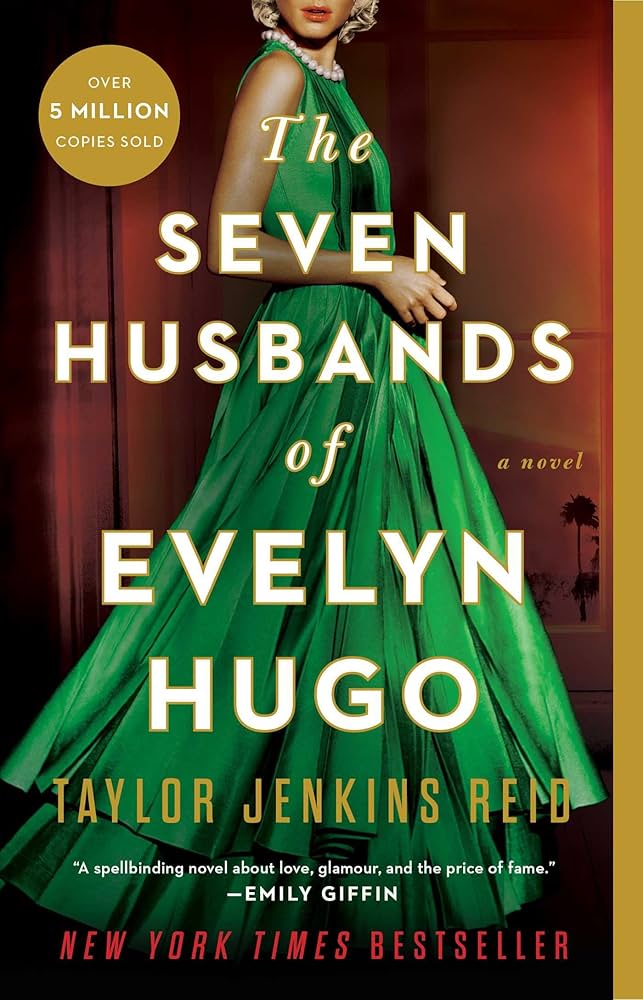In the luminous realm of modern literature, where words dance upon the page with the elegance of a ballerina en pointe, there emerges a work of singular distinction: The Seven Husbands of Evelyn Hugo by Taylor Jenkins Reid. This book, an intricate tapestry woven with the finest threads of human experience, stands as a testament to the profound depths of storytelling. Through its exploration of myriad themes and its unique literary style, it captivates the intellect and stirs the soul, beckoning readers into the intimate chambers of its narrative.
At the heart of this novel lies the enigmatic figure of Evelyn Hugo, a woman of celestial beauty and indomitable spirit, whose life unfolds in a series of marriages as varied and complex as the hues of a painter’s palette. Each husband, a distinct brushstroke, contributes to the masterpiece of her existence, revealing the multifaceted nature of love and the human condition.

Themes of Love and Identity
In the realm of love, Reid’s novel is a kaleidoscope of emotions, depicting love in its many forms—passionate, platonic, transactional, and forbidden. Evelyn’s relationships with her seven husbands serve as lenses through which the reader glimpses the shifting sands of affection and desire. Each union, marked by its own unique rhythm and cadence, underscores the transient yet transformative power of love.
Moreover, the novel delves into the labyrinth of identity, challenging the societal constructs that seek to define and confine. Evelyn, a Cuban-American, navigates the treacherous waters of Hollywood, concealing her heritage to ascend the echelons of fame. Her struggle for self-acceptance and authenticity mirrors the universal quest for identity in a world that often demands conformity. Through Evelyn’s journey, Reid eloquently explores themes of race, sexuality, and gender, inviting readers to contemplate the fluid and multifaceted nature of identity.
The Specter of Ambition
Ambition, that relentless specter, looms large over the narrative, driving Evelyn’s relentless pursuit of stardom. Her story is one of ascension and sacrifice, where the pursuit of dreams exacts a toll on the soul. Reid’s portrayal of ambition is nuanced, revealing its dual nature as both a beacon of aspiration and a harbinger of disillusionment. Evelyn’s sacrifices, her calculated decisions, and her moments of vulnerability paint a portrait of a woman who, despite her flaws, is profoundly human and relatable.

The Veil of Secrecy and Truth
The interplay between secrecy and truth is another cornerstone of the novel. Evelyn’s life is a delicate balance of revelation and concealment, where truths are carefully parceled out, and secrets are zealously guarded. This delicate dance between honesty and deception adds layers of intrigue and tension to the narrative, compelling readers to question the nature of truth and the cost of concealment. Reid’s masterful storytelling ensures that each revelation is as impactful as it is inevitable, culminating in a denouement that is both poignant and profound.
A Sapphic Love: The Heart’s True Desire
Amid the whirlpool of Evelyn’s marriages, there lies a love that transcends all others—a sapphic relationship with the radiant Celia St. James. This love, hidden from the prying eyes of a judgmental society, is the purest and most profound of Evelyn’s life. In Celia, Evelyn finds not just a lover, but a soulmate, a mirror to her own soul. Their relationship, fraught with challenges and separations, stands as a testament to the enduring power of true love.
This sapphic romance illuminates the narrative, offering a poignant exploration of forbidden love in an era unkind to such unions. It is a love that dares to defy societal norms, a beacon of authenticity in a world shrouded in pretense. Through Evelyn and Celia, Reid beautifully captures the essence of love that transcends gender, a love that is as profound as it is transformative.

Admonishing the Patriarchy: A Rebellion in Shadows
Looming like a specter over Evelyn’s life is the oppressive force of patriarchy, an ever-present adversary in her ascent to stardom. Reid’s narrative does not shy away from admonishing this pervasive system, instead, it boldly confronts it. Evelyn’s journey is a rebellion against the constraints imposed upon women, a fierce and unyielding struggle for autonomy in a male-dominated world.
Each of Evelyn’s marriages, each strategic alliance, is a calculated move in her battle against patriarchal oppression. Her story is one of resilience, of carving out a space for herself in an industry that seeks to commodify her. Through Evelyn’s eyes, Reid exposes the hypocrisy and double standards of Hollywood, critiquing a system that venerates women’s beauty while stifling their voices.
A Unique Literary Style
Reid’s literary style, distinguished by its lyrical prose and meticulous structure, elevates The Seven Husbands of Evelyn Hugo to a work of art. The novel is framed as a series of interviews between Evelyn and Monique Grant, a young journalist chosen to pen her biography. This narrative device allows for a seamless interweaving of past and present, creating a rich, layered texture that enhances the reader’s engagement.
The dialogue, imbued with authenticity and emotional resonance, breathes life into the characters, making them vivid and memorable. Reid’s prose, both elegant and accessible, captures the essence of Evelyn’s world with a painterly precision, rendering scenes with a vividness that lingers long after the final page is turned.

A Modern Classic
The Seven Husbands of Evelyn Hugo is more than a novel; it is a symphony of themes and styles, a poignant reflection on the human experience. Its exploration of love, identity, ambition, and truth resonates with a timeless quality, offering insights that are both profound and enduring. Through its unique literary style, Reid crafts a narrative that is as intellectually stimulating as it is emotionally evocative.
In celebrating Evelyn Hugo’s life, we are invited to examine our own, to reflect on the choices we make, the personas we adopt, and the truths we hold dear. This book, with its rich thematic tapestry and poetic grace, stands as an important work of contemporary literature, a beacon that illuminates the complexities of the human soul.









